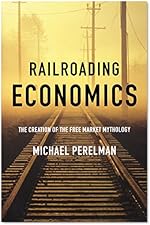“The real risk is that the U.S. faces a poverty cycle rather than an inflationary one.”
With all the crap coming down on the working class, one Wall Street Journal columnist at least has the sensitivity to see that a little inflation might be enough to push many people into poverty. At least that is better than ranting about all of the overpaid greedy workers.
Writing about the build up in inflation: “The real risk is that the U.S. faces a poverty cycle rather than an inflationary one.”
Evans, Kelly. 2011. “A Standard-of-Living Shock Is the Danger.” Wall Street Journal (17 February).
http://online.wsj.com/article/SB10001424052748703961104576148760984943294.html?mod=ITP_moneyandinvesting_0
Writing about the build up in inflation: “The real risk is that the U.S. faces a poverty cycle rather than an inflationary one.”

 25 – The Confiscation of American Prosperity: From Right-Wing Extremism and Economic Ideology to the Next Great Depression
25 – The Confiscation of American Prosperity: From Right-Wing Extremism and Economic Ideology to the Next Great Depression 30 – Manufacturing Discontent: The Trap of Individualism in Corporate Society
30 – Manufacturing Discontent: The Trap of Individualism in Corporate Society Class Warfare in the Information Age
Class Warfare in the Information Age Railroading Economics: The Creation of the Free Market Mythology
Railroading Economics: The Creation of the Free Market Mythology Steal This Idea: Intellectual Property Rights and the Corporate Confiscation of Creativity
Steal This Idea: Intellectual Property Rights and the Corporate Confiscation of Creativity The Invention of Capitalism: Classical Political Economy and the Secret History of Primitive Accumulation
The Invention of Capitalism: Classical Political Economy and the Secret History of Primitive Accumulation The Perverse Economy: The Impact of Markets on People and the Environment
The Perverse Economy: The Impact of Markets on People and the Environment
They are one and the same.
We have lived through a 40 year inflationary period.
Look at the graph here: http://mykindred.com/cloud/TX/Documents/dollar/graph1.php
It’s worth remembering that the gold standard ended once and for all in 1971.
Since then the relative cost of living has gone parabolic!
It’s the reason that the boomers could have one nice 9-5 job and leave Mom at home to raise the kids and all, and underlies the fact that people/couples cannot make ends meet today working two three, four, five jobs between them!
What is likely happening now, and what will finally push swathes of the world’s populous in to poverty is hyper-inflation. It’s already started as you show, it’s a train wreck and we’re in slow motion…
Systemic change is needed.
Actually, that graph looks more linear than parabolic, so calling it a parabole is a hyperbole ;)/
Seriously, though, cost of living increases have to be studied in conjunction with standard of living increases. It’s not like we haven’t improved our living conditions since 1800.
1. That our living conditions have “improved” is an opinion, it is not a fact. It is as much a matter of perspective that anything, I suggest you consider yours.
2. What good does it do us in the long term, that our miraculous development and perpetual growth is based on nothing more than faith and lies? The experiences we are having in the world today are testament to this, and many believe they are just the precursor for more yet… time will tell.
3. Fair point on the hyperbole, I stand accused. I could not find the graph that backed me up – so I used what I could find and said what I wanted anyway.
Sometimes it pays to check out a broader view of things. Human development has soared since 1970:
http://hdr.undp.org/en/data/trends/
While in the US the improvement has been small, development has been stupendously fast in most of the world. It may not help the unemployed in the US much to realize that the system that renders them superfluous is the same one that is pulling hundreds of others out of dire poverty, but it is true.
Now, part of the problem for the US is that while on average there has been progress in human development over the past 40 years, increasing inequality has offset much of that progress. This is a real problem, but one that is entirely internal to the US. To fix that, there is only one remedy, and that is socialism. Well, not really, but that is what Americans call any system that seeks to maximize human development by taking from the rich and giving to the poor.
The other part of the problem is that standards of living in the developed world may simply be too high. In the end, sustainable standards of living are determined by many things, but they do not depend on current standards of living. I.e. just because we’ve gotten used to living high on the hog for a couple of decades, does not mean we can sustain that. As the rest of the world catches up in education and infrastructure, their economies become more like ours, and it becomes harder to justify differences in the standard of living of hard-working people in Shenzhen, Bangalore or San Francisco. And if global living standards converge, it will almost certainly not be to ours…
So, I agree that systemic change is needed. The US needs to reduce inequality, spreading wealth creation over a larger swath of the population. That will soften the blow of decreasing living standards which is unavoidable in the medium term.
1. Like I alluded to above, we can prove whatever we want with the right cherry-picked graphs, statistics and damn lies! I don’t question the perception presented in your UN data.
However,
2. What have the environmental costs been during the same period? I don’t think we really need a graph to answer this one do we?
3. How has the disparity between rich and poor people (not nations) expanded in the same time period?
4. Our clever systems and indicators can not accurately or sensitively hope to convey factors of quality of life. Qualities like family, village, clan, and a sense of belonging. Qualities like knowing your land, belonging to the land rather that the land belonging to you. Qualities like learning the old ways from elders, like ceremony, like magic. Less infant mortality and more one size fits all ‘education’ may seem like ‘progress’, but it will never compare to what has been lost. Consider that before our ‘system’ came to be, the world was.
5. That you are bold enough to suggest there is but one remedy – and that you know what it is, and that it is socialism made me think, and I hasten to add not at all condescendingly, that you must be awfully young? No matter, I know why you go there, why you think this way. I would like to suggest to you that we shall only remedy by thinking and doing what has not yet been done. the solution is not to wealth redistribution. Even if it was, the only way to do so is to create conflict. No matter what the Professor may tell us, it has not worked nor will it ever work. What you propose – like Robin Hood – is not systemic change. It’s more of the same we have had, time and again. Think of France, think of Russia, think of China. Think of the many many tin-pot African nations.
Systematic change is kicking the whole concept of money and wealth out of the ball park, out of the atmosphere, and out of your consciousness.
I must go to sleep now. Wishing you peace and joy.
Freeman, I don’t go into ad hominem issues.
As to your other points, I don’t think you are serious about saying that our living conditions aren’t better than in 1800. It simply isn’t a matter of perspective, that one. So assuming that the rise in cost of living is all just inflation is not a reasonable starting point.
I agree that our living standards are unsustainable, in fact I said so. I don’t agree that this means we need to go back to pre-industrial revolution living standards, although that is probably the default outcome if we don’t act collectively to find a way out.
I think it’s strange to say that the gap between the rich and poor has expanded within nations over the past 30 years. That is true for autocratic regimes (like Libya), unregulated free-market economies (like Russia) and nominal democracies without actual political freedom (like China and the US). For the social democracies of western Europe (and others around the world), this isn’t actually true at all. These countries made progress (much more than the US in this time-frame) without widening the gap between rich and poor. The way they did this is by heavy regulation and investing tax money to develop their human capital (which is a fancy way of saying that they took money from the rich to make sure that even the poor afford healthcare and top-notch education for their children). You seem to think that this approach failed in France, but it’s a wealthy country where social mobility is high, as is productivity and technological innovation. Even so, there isn’t a wealth gap like there is in the US. You are right that there is continuous conflict in France, but that is the natural consequence of political and economic freedom. The only countries where there is no such strive are those where those freedoms are highly restricted – like China and the US.
When I think of learning from my elders, learning ceremonies and magic, I think largely of those tin-pot African countries you seem to despise. Yes, there are more important things in life than money, but doing away with money is not the answer, it’s just an overreaction. Take it from me, who might well be your elder: money isn’t going to go away – ever. We need to take it as a fact of life and deal with it, not run from it.
Good, I’m glad. Neither do I.
I am serious. It is a matter of perspective, because we are able to disagree about this proves it.
The rise in the cost of living has risen meteorically since the 70’s. This is quantifiable.
Why else would wage stagflation be an issue if it were not for the inflationary nature of the perpetual unhinged growth forever economy?
What was so wrong with pre-industrial revolution living standards? And what is so right with our standards today? I feel like I have already said this and you didn’t hear me? Do you think the busyness of modern life is something to be celebrated? Do you think that the vast increase in mental health problems is an improvement? That our children are routinely medicated for just being children? That we continue, despite the overwhelming evidence that it’s a very bad idea, to destroy and desecrate our planet as we use up the finite resources? That most of the ever growing urban populace do not know where their food comes from (i.e. that milk come out of a cow’s udders)? That most people cannot see the starts at night in the sky, due to light pollution? That one of the biggest causes of death is the polluting and dividing automobile that see most in the west racing around on a daily basis…?
When you discount autocratic regimes (south america, africa, most of asia), Russia (and the former soviet bloc), China, and the US (and therefore by definition the UK) – you are not left with much. You are left with Western Europe. The Scandinavians are probably your poster boys? It actually seems that Japan has the least inequality: http://en.wikipedia.org/wiki/List_of_countries_by_income_equality
I think the reason they take this position, is because they have a cohesive view a result of the homogeneous nature of their society. Germany’s also very high up. You might consider that Western Europe and Japan were pretty well destroyed by 1945, and they had to be rebuilt – socially as well as economically. Perhaps we will have to have equal destruction in the states too if we are ever to find consensus?
Q- How do you square maintaining our ‘standard of living’ (by which I am assuming you mean petro-chemical ag and pharma and electronics) but stop plundering and polluting the earth? How?
And why is it so desirable?
More of the old ways are alive in Africa this is true? For someone who makes the claim they do about ad hominen “issues” – I would ask you to reconsider your assumption about my “despising” tin-pot African countries. I certainly did not say so? And anyway, you prove my point – America did a great job annihilating the indigenous here, as the Roman’s did to the European forefathers who came here, so that all we know now in our advanced high quality of living is that there’s a guy called Harry Potter and that some African’s might know some good juju. A poor reflection on our “progress”, but that’s only my opinion.
Anyway old person who is sure of themselves and idea, good luck with it. I’d wager a beautiful sunset that money as you and I know it will be gone within 40 years…
Aren’t two jobs necessary because of stagnating wages?
Yes, inflation is partly responsible; prices have gone up, but wages have not. So today you need two incomes to have buying power roughly equivalent to what it was pre-Reagan.
You correctly point out that prices have gone up, but miss the other component. Isn’t that equally–if not more–important?
I don’t miss it, I just didn’t spell out the patently obvious. In saying they are one and the same I encapsulated my point. Inflation and wage stagnation are two sides of the same coin.
If it were not for the created inflation – there would be no need for wages to increase.
Sure, raising wages to where people could more comfortably survive again would seem like a good idea. But can the companies afford to pay a decent living wage, or are they operating on just as tight margins as most domestic budgets? Are we saying that corporations just ‘aint as benevolent as they once were, or is it the case that nothing can grow forever and that the inherently inflationary system we have is destined to fail?
AFW
The reason why US middle class life in the fifties and sixties was so easy is because all its economic rivals had been destroyed by a war that left the US unscathed. From the plains of Russia to the hills of Rome, and from Hokkaido to Peshawar, there was no functioning industrial base left. Tens of millions of young men were dead, maimed or traumatized. Many of the most educated survivors fled the destruction and came to the US, rapidly creating the largest concentration of knowledge and technological progress the world has ever seen. The post-war convulsions that broke up the colonial empires destroyed century-old business models, and the fight to control the newly independent countries made most of them weak, and prone to outside influence.
So there is absolutely no mystery as to why life in the US was so easy back then. When the workforce in Europe and Japan started recovering (their first post-war workers entered the workforce in the late sixties), US workers found themselves with real competition again, which is why progress started to slow. Every decade since, more of the world has “come online”. As the world flattens, the developed world has to squeeze more productivity out of every worker.
This is the main economic reason why the US needs to maximize its human development: it cannot afford to waste human capital by not pushing every citizen to his or her maximum capability.
it’s a big fail for everyone but the rich.
Hey, Endo – down here!
You’re right and you’re wrong.
My point was, and is, that is was still easier to survive in the 80’s than it is today, and the 70’s were easier still, and the 90’s got harder, and here we are now in the teens…
And I’m not just talking about the USA. It was the same in Europe too. It’s much harder to make ends meet today than it was over the preceding 4 decades. There have been some peaks and troughs for sure, boom and bust. Yet the overall trend has been one of tougher times for real people. And, I maintain, this is a direct (yet concede not exclusive) result of unpegging the world’s currencies from the stability afford them of a gold standard and the resulting inflation (and it’s going parabolic I promise you…).
All down hill since ’73!
http://www.chrismartenson.com/blog/shadowstats-john-williams-explains-why-its-all-been-downhill-1973/53536?utm_source=newsletter_2011-03-05&utm_medium=email_newsletter&utm_content=node_title_53536&utm_campaign=weekly_newsletter_8